What Is HubSpot? A Comprehensive Guide

At Drop Cowboy, we often get asked, “What is HubSpot?” It’s a powerful platform that’s revolutionizing how businesses manage their customer relationships and marketing efforts.
In this comprehensive guide, we’ll break down HubSpot’s core features, pricing plans, and integration strategies. We’ll also explore how this all-in-one solution can transform your business operations and drive growth.
What Are HubSpot’s Core Features?
HubSpot offers a comprehensive suite of tools designed to streamline business operations and enhance customer relationships. At its core, HubSpot’s Customer Relationship Management (CRM) system serves as the central hub for all customer data. This free CRM integrates seamlessly with HubSpot’s other core features, making it a popular choice for businesses of all sizes.
Marketing Hub: Power Your Inbound Strategy
The Marketing Hub stands as HubSpot’s powerhouse for inbound marketing. It includes tools for email marketing, social media management, and content creation. HubSpot’s own data suggests that businesses using their marketing tools see an average increase of 129% in leads within the first year. The Marketing Hub also offers advanced features like A/B testing and marketing automation, which can significantly improve campaign performance.
Sales Hub: Optimize Your Sales Process
HubSpot’s Sales Hub focuses on enhancing the sales process through automation and data-driven insights. It includes features like email tracking, meeting scheduling, and pipeline management. Users can create and manage deals directly within the CRM, providing a clear overview of the sales pipeline. HubSpot reports that users of their Sales Hub close 36% more deals on average.
Service Hub: Enhance Customer Support
The Service Hub aims to improve customer service operations. It includes tools for ticket management, knowledge base creation, and customer feedback collection. One of its most useful features allows businesses to create a comprehensive help center, which can reduce the workload on support teams. According to HubSpot, businesses using the Service Hub see a 37% improvement in ticket closure rates.
CMS Hub: Simplify Content Management
HubSpot’s Content Management System (CMS) Hub allows businesses to create and manage website content without extensive technical knowledge. It includes features like drag-and-drop editors and built-in SEO tools. The CMS Hub also integrates with HubSpot’s other tools, allowing for personalized content delivery based on user data from the CRM.
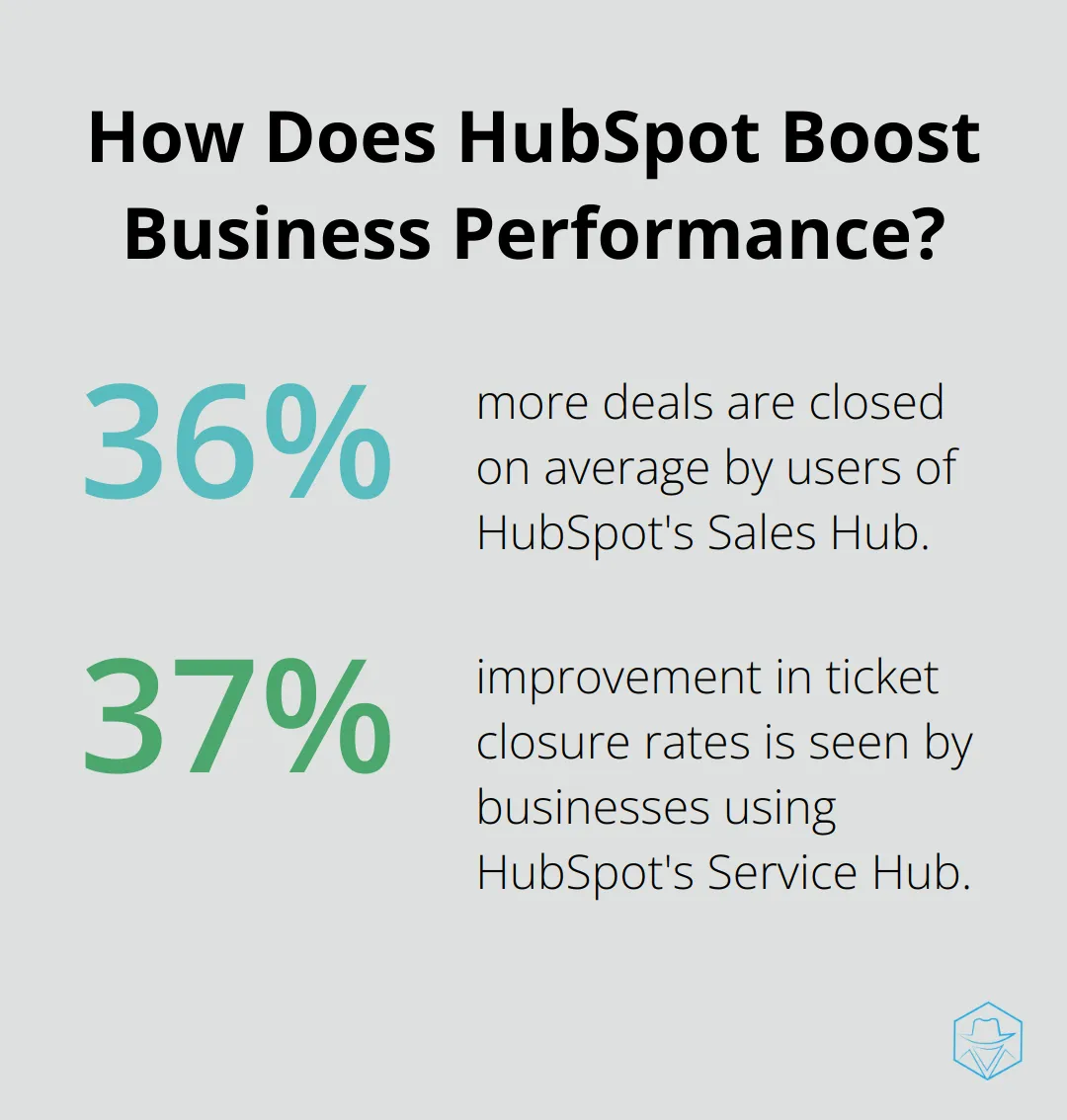
While HubSpot offers a robust set of features, some businesses might find the platform overwhelming or more than they need. Specialized communication tools (like Drop Cowboy’s ringless voicemail and SMS features) can serve as powerful alternatives or complements to broader platforms like HubSpot. These targeted solutions can enhance any marketing or sales strategy, whether used alongside HubSpot or as standalone options.
As we explore HubSpot’s features, it’s important to consider how they align with your business needs. Let’s now turn our attention to HubSpot’s pricing structure and the various plans available to users.
How Much Does HubSpot Cost?
HubSpot’s pricing structure accommodates businesses of various sizes, from startups to large enterprises. A careful consideration of needs and budget is essential before selecting a plan.
Free Tools: Start Your CRM Journey
HubSpot’s free tools offer small businesses an entry point into CRM and marketing automation. The free CRM includes:
- Basic contact management
- Deal tracking
- Task management
These features provide a solid foundation for businesses new to customer relationship management.
Paid Plans: Expand Your Marketing Arsenal
For businesses ready to invest in advanced features, HubSpot offers three paid tiers: Starter, Professional, and Enterprise. Each tier builds upon the previous one, adding more sophisticated tools and capabilities.
Starter Plan ($50/month)
The Starter plan includes:
- Ad management
- Landing pages
- Forms
This plan suits small businesses looking to expand their marketing efforts beyond basic CRM functionality.
Professional Plan ($890/month)
The Professional plan adds:
- Marketing automation
- Smart content
- A/B testing
HubSpot reports that businesses using this plan see an average of 129% more leads within the first year.
Enterprise Plan ($3,200/month)
The Enterprise plan caters to larger organizations, offering:
- Custom event triggers
- Predictive lead scoring
- Advanced reporting
Feature Comparison Across Plans
When selecting a plan, prioritize features that align with your business goals. For instance:
- Content marketing focus? Consider the CMS Hub.
- Sales process streamlining? Prioritize Sales Hub features.
HubSpot’s all-in-one approach benefits many, but it might not fit every business. Some companies only need specific features and prefer specialized tools. For direct customer communication, platforms like Drop Cowboy (which specializes in ringless voicemail and SMS marketing) might offer a more cost-effective solution.
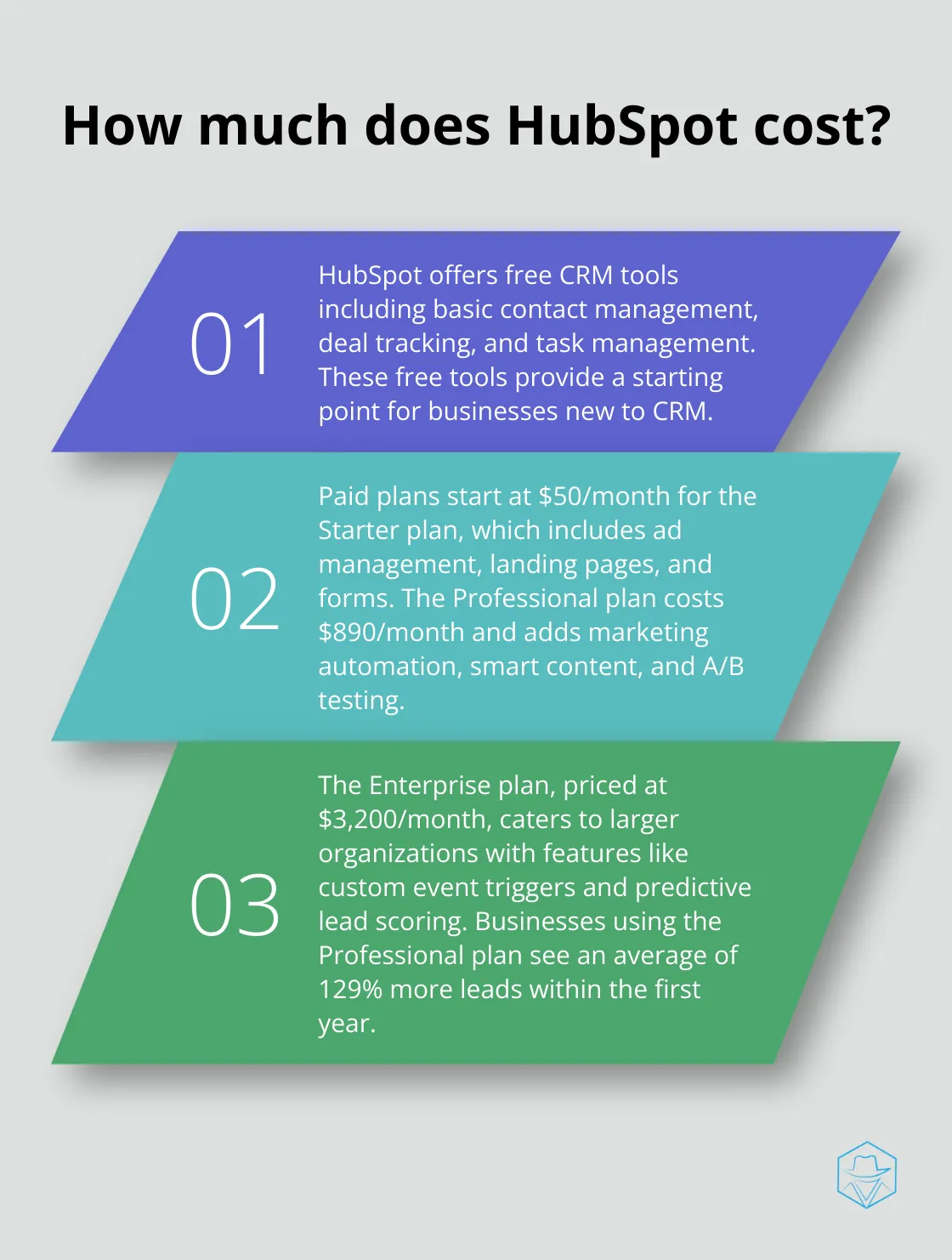
Factor in potential return on investment when evaluating HubSpot’s pricing. While costs (especially for Professional and Enterprise plans) might seem high, the potential increase in leads and sales could justify the expense for many businesses.
As we move forward, let’s explore how to integrate HubSpot into your business operations and maximize its potential.
How to Integrate HubSpot Into Your Business
Define Your Goals
The first step to integrate HubSpot involves a clear definition of your objectives. Do you want to improve lead generation, streamline your sales process, or enhance customer service? Once you identify your goals, you can focus on the specific HubSpot tools that align with these objectives.
Audit and Prepare Your Data
Before you start with HubSpot, audit your existing data and processes. HubSpot performs best with clean, organized data. Take time to clean up your contact lists, standardize your data formats, and document your current workflows. When you’re ready to migrate, HubSpot offers various import tools. We recommend you start with a small subset of your data to test the process before a full migration.
Train Your Team
The effectiveness of HubSpot depends on your team’s ability to use it properly. HubSpot Academy offers numerous free training resources (including video courses, certification programs, and documentation). Create a training plan for your team that focuses on the specific HubSpot tools they’ll use in their roles. For instance, your marketing team should prioritize courses on the Marketing Hub, while your sales team focuses on the Sales Hub. Companies with certified users see a 15% increase in productivity compared to those without.
Implement Best Practices
When you implement HubSpot, start small and scale up. Master one or two key features before you move on to more complex tools. This approach allows your team to adapt gradually and prevents overwhelm. Customize HubSpot to fit your business processes, not the other way around. Use HubSpot’s customization options to create fields, workflows, and reports that align with your specific needs. Set aside time each quarter to assess your usage, clean up data, and explore new features that could benefit your business.
Consider Real-World Examples
While HubSpot boasts many success stories, results can vary. One mid-sized B2B company reported a 300% increase in leads after they implemented HubSpot’s inbound marketing strategies. However, they also noted that it took six months of consistent effort to see these results. Another small e-commerce business saw a 25% increase in customer retention after they used HubSpot’s Service Hub to improve their customer support processes. They attributed this success to their ability to track and quickly respond to customer inquiries across multiple channels.
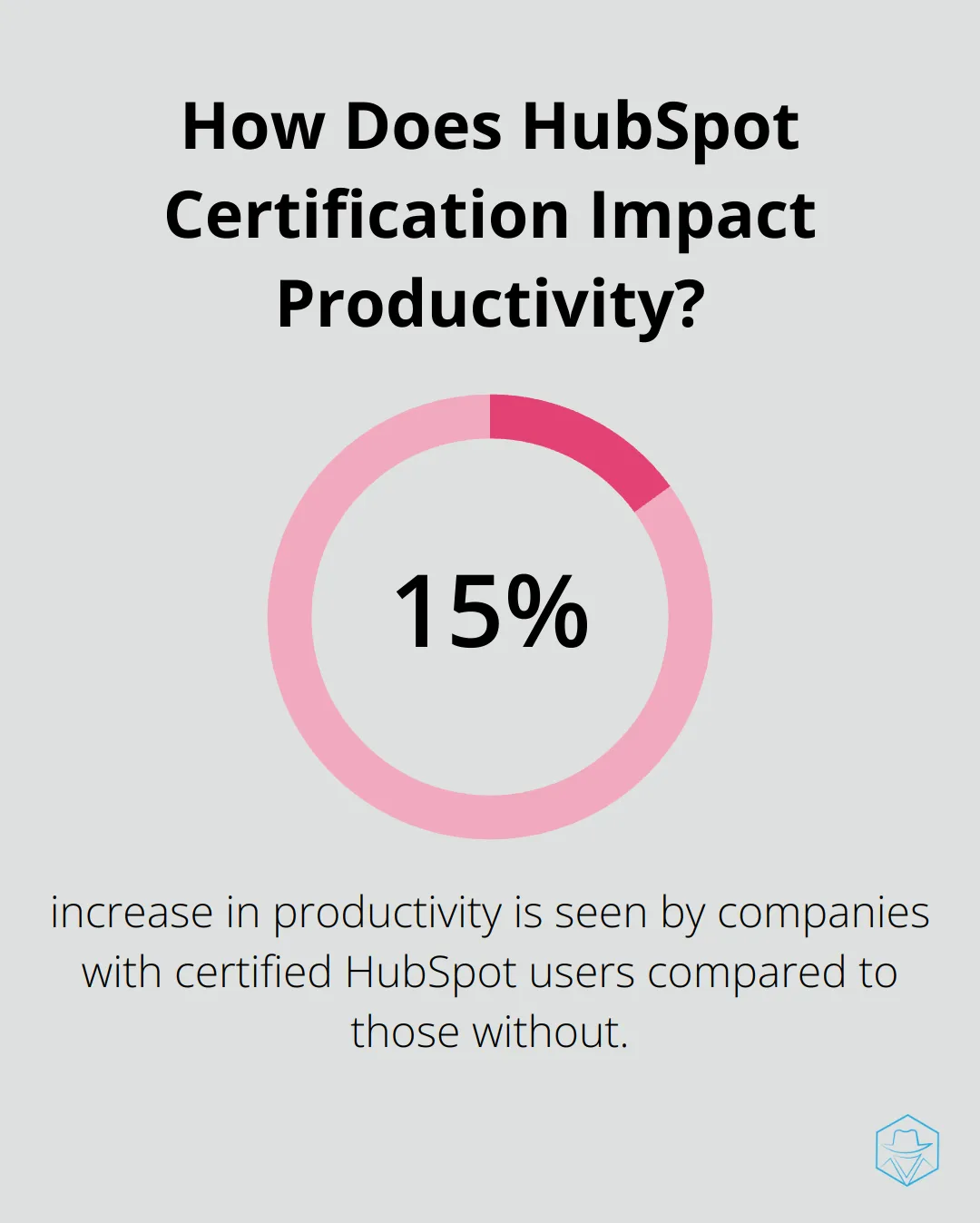
HubSpot can be powerful, but it’s not always the best fit for every business. Some companies find that more specialized tools better suit their needs. For instance, businesses that focus heavily on direct customer communication might find platforms like Drop Cowboy (with its ringless voicemail and SMS features) more effective for their specific goals.
Final Thoughts
HubSpot has positioned itself as a comprehensive platform for businesses to streamline their marketing, sales, and customer service operations. Its integrated approach offers significant benefits, including improved lead generation, enhanced customer relationships, and data-driven decision-making capabilities. The platform’s versatility, from its free CRM to advanced enterprise solutions, makes it adaptable to various business sizes and needs.
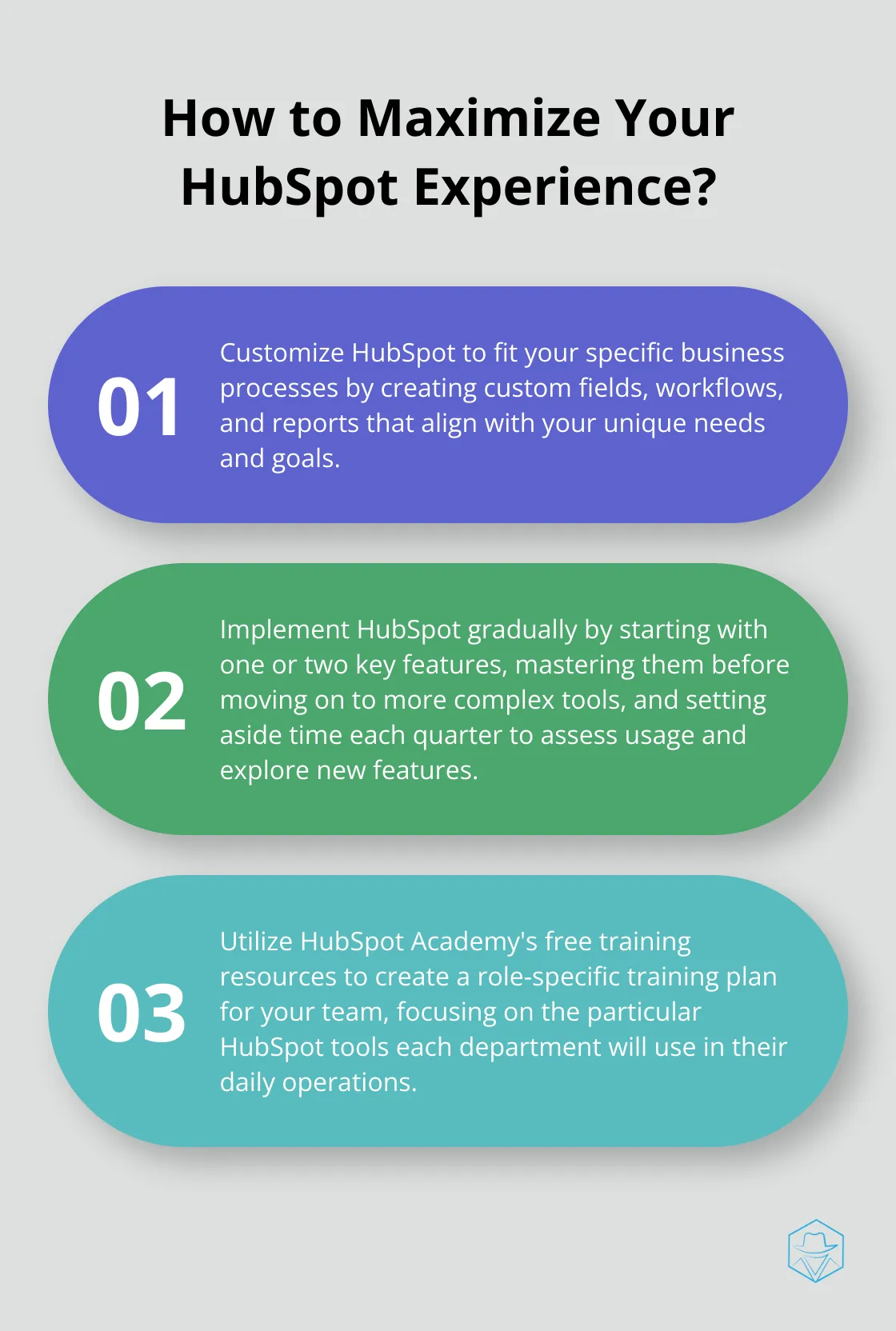
When considering what HubSpot is and whether it’s right for your business, you must evaluate your specific requirements and resources. While HubSpot’s all-in-one solution can be powerful, some organizations may find that they only need certain features or that specialized tools better suit their needs. For instance, businesses focusing heavily on direct customer communication might find platforms like Drop Cowboy more effective for their specific goals, especially for ringless voicemail and SMS marketing.
HubSpot will likely continue to evolve alongside inbound marketing trends. We expect to see further integration of AI and machine learning capabilities, more sophisticated personalization features, and enhanced data analytics tools. As digital marketing landscapes shift, HubSpot’s commitment to innovation positions it well to adapt to changing business needs (though only time will tell how successful these adaptations will be).
blog-dropcowboy-com
Related posts

March 7, 2025
Creative Text Marketing Ideas to Boost Conversions
Boost conversions with creative text marketing ideas. Explore proven strategies and actionable tips to maximize your reach and engage effectively.

March 10, 2025
Ringless Voicemail Wholesaling: Tips for Success
Boost your business with ringless voicemail wholesaling tips. Learn strategies, maximize efficiency, and drive results in your marketing efforts.

March 26, 2025
HubSpot or Zoho: Choosing the Best CRM Platform
Compare HubSpot vs Zoho to find the best CRM platform for your business needs. Explore features, pricing, and user reviews in our detailed analysis.

March 20, 2025
Marketing Automation in CRM: Benefits and Implementation
Explore marketing automation in CRM, its benefits, and implementation tips to streamline processes and boost customer engagement effectively.

April 4, 2025
Real-World Example of Marketing Automation in Action
Explore an example of marketing automation that boosts efficiency and results. Learn how successful companies implement automation in their strategies.
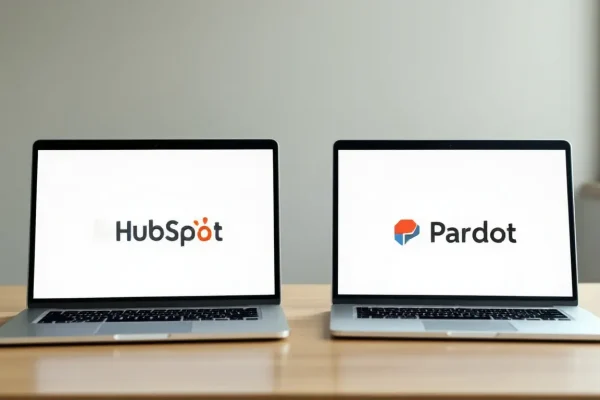
March 27, 2025
HubSpot vs Pardot: Battle of Marketing Automation
Compare HubSpot vs Pardot to choose the best marketing automation tool for your business needs. Analyze features, pricing, and effectiveness.